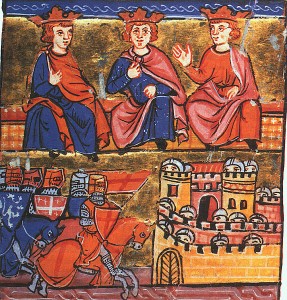Hilaire BELLOC
(27 July 1870 – 16 July 1953)
July
The Kings come riding back from the Crusade,
The purple Kings and all their mounted men;
They fill the street with clamorous cavalcade;
The Kings have broken down the Saracen.
Singing a great song of the eastern wars,
In crimson ships across the sea they came,
With crimson sails and diamonded dark oars,
That made the Mediterranean flash with flame.
And reading how, in that far month, the ranks
Formed on the edge of the desert, armoured all,
I wish to God that I had been with them
When the first Norman leapt upon the wall,
And Godfrey led the foremost of the Franks,
And young Lord Raymond stormed Jerusalem.
Iulie
Hilaire BELLOC (1870-1953)
Monarhii se întorc din Cruciadă,
În falnică armată de creştini;
Oraşu-i surd în marş de cavalcadă;
Monarhii i-au învins pe Sarasini.
Cântând un imn străvechi din Răsărit,
În flota ce-a învins oceanul mare,
În galeoane valul au vâslit,
Orbind Mediterana cu-al lor Soare.
Iar cronica spunând cum au luptat,
Trecând deşertul în armura grea,
Rugat-am Domnul să-mi asculte imnul
Când toţi Normanzii au săltat in şea
Şi Godfrey-n toiul luptei, exaltat,
Cu Raymond, a cuprins Ierusalimul.
(Rendered in Romanian
by Constantin ROMAN, London,
© 2012, Copyright Constantin ROMAN)
BIOGRAPHICAL NOTE:
Upon being honored with a papal decoration well into his old age, Belloc refused to put out the money needed to buy the medal and grumbled: What would they say if I changed my mind?
Hilaire Belloc was not built to fit any cloth fashioned by mortal man. Although he often groused about his own age (I do not mean his chronological age he always complained about that! but his moment in time), Belloc would have been impossible in any other age. Growing up as he did, in the twilight of the reign of Queen Victoria, blinking brilliantly in nonsense verse and radical politics in the time of King Edward VII, a child prodigy called by his aunt Old Thunder, Hilaire Belloc reposed upon a broad upper-middle-class English society that read him, first adored him, then good-naturedly put up with him, and finally isolated him. I was once welcome in that house, he commented wistfully when the automobile in which he was driving passed the home of an exceedingly rich man. His intransigent defense of all things Catholic first amused a literate and basically skeptical gentry looking for novelty; then offended; finally, it was considered intolerable.
A. N. Wilson in his biography of Belloc wrote: If I created a character in a novel as Hilaire Belloc, people would not believe it. Belloc was a paradox: a lyrical poet who never read any contemporary poetry; a rhymester whose high finks still charm children; an artilleryman on bivouac at Toul who smelled the Revolution as France went by; an aging monarchist who savored the last charge of Charles I at Naseby; the most versatile and certainly the finest English prose stylist in this and possibly any century, who grumbled from the liberty of his battered old boat, the Nona, dear reader, read less and sail more even as he lusted for bigger and better-paying audiences; the perpetual wanderer tramping Europe, burning for adventures even as he sang the praises of a rooted peasantry and a hearth steeped in seasonable traditions that halted the cruelty of time; the enemy of the rich and of capitalist greed, who once asked for a bucket of money as a birthday gift; the passionate advocate of Truth, who once groused, however, that the truth always limps; the drummer boy of an English-speaking Catholicism he helped make proud of itself.
From: Hilaire Belloc: Defender of the Faith
by Frederick D. WILHELMS




No Comments so far ↓
Like gas stations in rural Texas after 10 pm, comments are closed.